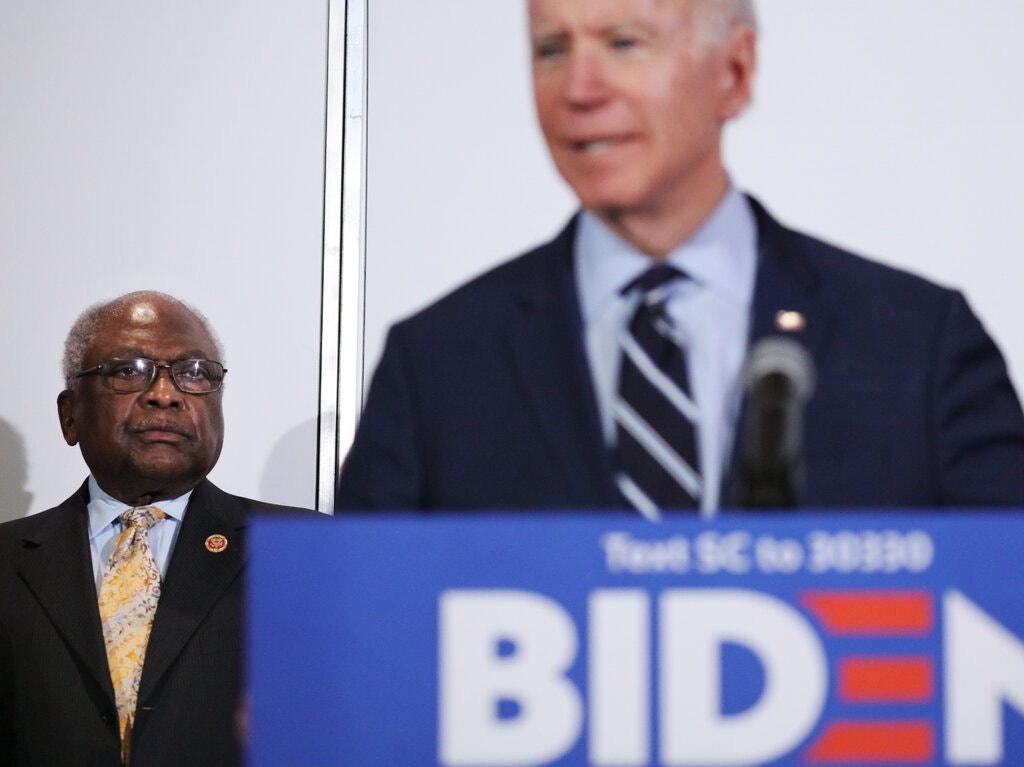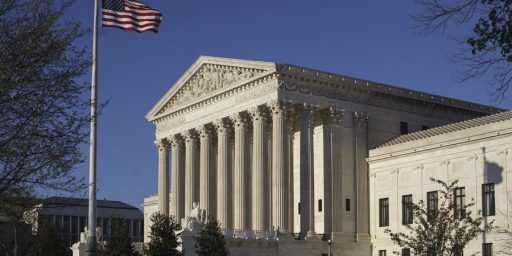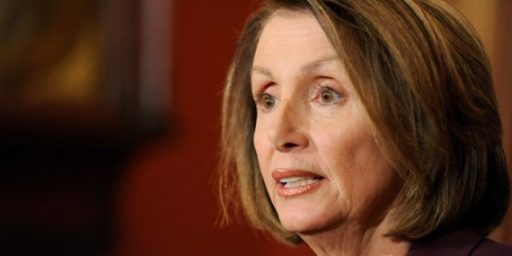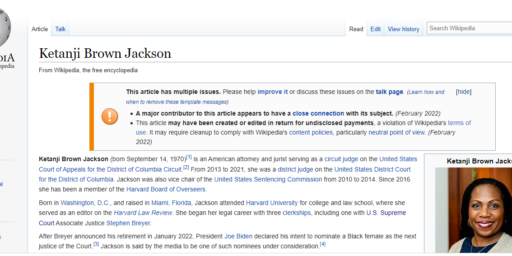First Black Woman Supreme Court Justice
Democrats are already jockeying to influence President Biden's pick should a vacancy arise.

The NYT‘s Jonathan Martin reports on “How Democrats Are Already Maneuvering to Shape Biden’s First Supreme Court Pick.”
After meeting in the Oval Office earlier this month with President Biden, Vice President Kamala Harris and his fellow senior House Democrats, Representative James E. Clyburn of South Carolina made a beeline to Ms. Harris’s office in the West Wing to privately raise a topic that did not come up during their group discussion: the Supreme Court.
Mr. Clyburn, the highest-ranking African-American in Congress, wanted to offer Ms. Harris the name of a potential future justice, according to a Democrat briefed on their conversation. District Court Judge J. Michelle Childs would fulfill Mr. Biden’s pledge to appoint the first Black woman to the Supreme Court — and, Mr. Clyburn noted, she also happened to hail from South Carolina, a state with political meaning for the president.
Clyburn is widely credited at turning out Black voters in his state’s pivotal primary and thereby turning the tide for Joe Biden. Certainly, Biden seems to think so, as he has given Clyburn enormous sway in picking personnel, including his insistence on a Black Secretary of Defense.
Childs would be an unconventional choice, indeed, for SCOTUS. My initial instinct was the Biden’s pledge to pick the first Black woman to the bench put him in the same position as Ronald Reagan was in four decades ago having pledged to nominate the first woman, period: being forced to pick someone less qualified than typical for the position because of a shallow pool of candidates. But there’s more going on here:
The early jockeying illustrates how eager Democratic officials are to leave their mark on Mr. Biden’s effort to elevate historically underrepresented contenders for a landmark Supreme Court nomination. But it also casts a spotlight on discomfiting issues of class and credentialism in the Democratic Party that have been just below the surface since the days of the Obama administration.
Some Democrats like Mr. Clyburn, who have nervously watched Republicans try to repackage themselves as a working-class party, believe that Mr. Biden could send a message about his determination to keep Democrats true to their blue-collar roots by choosing a candidate like Ms. Childs, who attended public universities.
At first blush, that strikes me as silly symbolism. After all, Berkley and the University of Virginia are public universities but their law schools are more well-regarded than those at many Ivies. But this is a strong argument:
“One of the things we have to be very, very careful of as Democrats is being painted with that elitist brush,” said Mr. Clyburn, adding: “When people talk to diversity they are always looking at race and ethnicity — I look beyond that to diversity of experience.”
Representative G.K. Butterfield of North Carolina, like Mr. Clyburn a veteran member of the Congressional Black Caucus, made a similar point in an email to the White House counsel, Dana Remus, last month listing the caucus’s preferred criteria for federal court appointments. Near the top of the list, Mr. Butterfield said, was: “The judge should have a diversity of experience in multiple settings and in multiple areas including experiences outside of the law.”
As I noted recently, I’ve changed my mind on this issue in recent years. While I prefer brilliant legal minds on the Supreme Court, drawing its justices exclusively from the federal Courts of Appeal (and especially the DC Circuit) or the faculty of the elite law schools creates too narrow a view of the law. We should certainly have people with other experience—including criminal defense attorneys and probably a seasoned politician or two.
As to Childs in particular, there’s just not enough to go on here:
Unlike eight of the nine current Supreme Court justices, Ms. Childs, 54, did not attend an Ivy League university. Her mother worked for Southern Bell in Columbia, S.C. and Ms. Childs won a scholarship to the University of South Florida. She later graduated from the University of South Carolina’s law school and became the first Black woman to make partner at one of the state’s major law firms. In the fashion of an earlier generation of jurists, she rose in state politics before being appointed to the bench. Ms. Childs served as a top official at South Carolina’s labor department before being appointed to the state’s workers’ compensation board.
“She is the kind of person who has the sort of experiences that would make her a good addition to the Supreme Court,” Mr. Clyburn said.
She’s clearly accomplished. And I like her diversity of experience. I have no idea, though, of her judicial philosophy or, indeed, whether she even has one.
As the piece goes on to note, there are plenty of Black women for Biden to choose from. There are few who have checked the federal Appeals Court box but many with elite credentials and experience in prominent legal posts. It shouldn’t be hard to find one that will sail through confirmation, should a vacancy arise.






Psst. I’m pretty sure the person in the picture is a black man, not a black woman.
While this may be true, the current crop of Justices (ex Amy Coney Barrett!) is from either Harvard or Yale Law. Not Columbia, not Cornell, not Brown, not Dartmouth, not Penn, not Princeton. Just Harvard and Yale.
And I flat don’t like the notion, which is deeply embedded in our nation’s consciousness, that what you did in college determines everything about your path in life.
I wish to note that I’ve met a lot of Ivy League graduates, and I am not knocking them. I like them, and they are generally good.
HOWEVER, they do not have a lock on talent, on ability, on work ethic, etc. Some people bloom later in life. Some just skip the whole Ivy thing, because why bother?
I think this is a good thing, and the Republicans made this play before the Democrats (with Barrett). This irritates me a bit.
You could say the same of Amy Coney Barrett. She didn’t exactly wax lyrical in her confirmation hearings.
@Gustopher: Not only is Joe senile–but he’s also apparently blind.
From an organizational standpoint. The Court should have a good mix of technicians of the law and appliers of law. In simpler terms it should have both Pharisees AND Sadducees.
Among the Supremes and Fed Courts of Appeal, we are over represented by Harvard, Yale and the other Ivies and Stanford, both the law schools and undergrads (sorry HL92). Yes, choose the next justice from someplace else. And let them not be a sitting appellate judge. How about a state SC justice or a former office holder. Someone who has a better ideal of what life is for 99%.
@Gustopher: I think the person in the picture is Rep. Clyburn. I’m a little face-blind, so I’m not certai– nevermind, found what looked like a shot taken five seconds before or after on Politico that says it’s Clyburn.
Would you care to explain why Kavanaugh’s 12 years as a district judge made him “extremely well qualified”, but Childs’ 11 years make her “less qualified than typical for the position”?
1) “Less qualified than typical” isn’t always a bad thing, with the emphasis being placed on “typical” rather than “less qualified.” “Typical” is an odd qualifier for something that happens as rarely as an appointment to the Supreme Court.
2) The number of lawyers who are women currently rests at around 1 in 3, or at 38%.
3) While the number of women who are judges is lower, it’s not by that much (~30%).
I’m sure there are extremely well-qualified Black women who would be fantastic Supreme Court Justice nominees.
I disagree with this for a couple of reasons. We’re not a meritocracy. Just because you have a white guy who went to Yale and then Harvard like GWB doesn’t mean he’s more qualified than the black guy who went to San Diego State. Sure, he is on paper, and that paper is garbage. We all know that the Ivies aren’t a meritocracy and legacy admissions constitute something like half of the white people at Harvard. If the Ivies only admit the very best and brightest then Jared Kushner is in the top echelons of intellect. I’d argue that if you pick a list of 40 Supreme Court candidates there’s hardly a dime’s worth of difference between any of them save in ideology.
Robert McNamara was one of those best and brightest, UC Berkeley, Harvard, trustee at Cal Tech. And what did he accomplish? Well after helping to develop the Edsel, he joined the government and played a major role in escalating Vietnam. Best and Brightest! SCOTUS candidates are like astronauts. If you narrow them down to a list of 40 just pick whatever handful you need at random and put them on the rocket. They’re going to succeed, or they’re going to fail, and there’s just no way to tell future performance from past performance.
By the way, speaking of the best and the brightest and the Edsel, if you read the book American Icon you’ll see that when Ford nearly went bankrupt, the reason Ford went from poor quality to right behind Toyota, so good that I bought one, was a black executive named Benny Fowler, Vice President of Quality Control, whose education consisted of Indiana University and Central State University.
(And I’m not attacking Harvard in particular, all the Ivies do it)
https://www.nbcnews.com/news/us-news/study-harvard-finds-43-percent-white-students-are-legacy-athletes-n1060361
“Study on Harvard finds 43 percent of white students are legacy, athletes, related to donors or staff
The number drops dramatically for black, Latino and Asian American students with less than 16 percent each coming from those categories, the study said.”
Isn’t that statement really code for “I’m not sure that she will make decisions of which I approve,” and isn’t it time that we stopped trying to gerrymander the courts? (Particularly when the ability to do so has become so disproportionate.) Asking for a friend (and already knowing the answer, too 🙁 ).
She is way too old. They need to find someone in their early forties, maybe even late 30s.
Steve
@Sleeping Dog: While I am not sure that a former politician or state SC justice represents “someone who has a better ideal of what life is for 99%” in our current cultural climate (and probably didn’t in past climates, either), I still think that the idea is good. We already know that Ivies and other prestigious schools don’t produce the most capable, creative, wise, industrious, leaderlike persons in most fields. It’s likely to be true in government and the judiciary, too.
@Stormy Dragon: You really need to ask? [eye roll emoji]
@steve:
pre-natal
@Just nutha ignint cracker:
No guarantees of course, but I someone who has been a pol or sitting on state SC bench has more likely been dealing with issues that are common to most citizens, rather than someone who was an Ivy undergrad, then Harvard/Yale law to a prestigious law firm to the federal bench. Choosing justices from varied background was once pretty common, think Earl Warren, Sandra Day O’Connor and David Souther. The problem that presidents have with such jurists, is that they aren’t predictable and ideology has become the most important check box when selecting a nominee.
@Gustopher: Right. It’s the photo from the NYT report of Biden and Clyburn.
@Stormy Dragon: I don’t understand the question. Kavanaugh was on the DC Circuit, the most prestigious appellate court other than SCOTUS, for years.
@Just nutha ignint cracker: Sure, everyone prefers justices who will rule they way they prefer. But I’m more interested in how they get to their decisions. It was a critique I leveled at Harriet Miers back in the day but at least partly recanted in the post linked in the OP.
@Stormy Dragon:
At the risk of awarding participation medals, can we concede that Judge Childs is differently qualified than typical for the position. I think most of the discussion above is about whether that difference is neutral or good. Interestingly, in the case of a nomination of Judge Childs, ACB’s recent ascension may be the blocking defense to the Harriett Miers gambit.
@Jen: @Joe: I don’t think we’re in disagreement. My initial reaction wasn’t my final reaction.
Annnnd goalposts moved.
@Gustopher: You never know these days.
@Sleeping Dog:
No offense taken. I’ll agree with that. I propose, and would be thrilled with, either Ketanji Brown Jackson or Leondra Kruger. I’ve never heard of this lady that Clyburn is pushing.
@Jay L Gischer:
My own personal complaint is how few of the Circuit courts are represented on the SCOTUS. Prior to Trump, the last President that changed the diversity on this axis was Reagan. Kennedy used to surprise East Coast pundits who forgot he was a California boy who spent time on the 9th Circuit. Gorsuch has already surprised — shocked? — East Coast pundits who didn’t consider his time on the 10th at least once.
@James Joyner:
Because the reasoning for “prestige” is circular, which I think was the biggest take away from the affirmative action piece you analyzed.
Why are YHS more prestigious than UVA, Berkeley, and Michigan? Because their graduates get hired by prestigious, powerful law firms and prestigious, powerful judges at higher rates. It’s a closed feedback loop. Open it up too much, and it can no longer self-correct to the desired outcome.
The law school example is a reflection of all the reasons that our society isn’t all that open in the first place.
Law school rankings employ a standard of quality. That measure of quality is based on outcomes that are shaped mostly by broad socioeconomic relations and specific personal relationships. But they don’t necessarily measure the intellect of graduates.
The rankings serve as a pseudo-objective ballast for an incestuous loop. And then we wonder why the bodypolitic has congenital deficits.
@Kurtz: i’ve heard Scott Galloway say on a few occasions that he never ever should’ve been hired as an investment banker at Morgan Stanley, but he was, simply because his mom happened to be friends with some important guy there and she introduced them.
And it’s not that they don’t have good people there, they obviously do, but for the 43% of Jared Kushners they let in they have to have really high standards on the 57% on the opposite side of the spectrum, to keep their scores and rankings up.
(Oddball coincidence, at some point Kushner was at NYU and took a class by Scott Galloway)
@Kurtz:
I wouldn’t really take it that far, although I can see why you’d want to. Speaking as someone other side of that equation, i.e. the “high powered law firm” you referred to, I can tell you that we hire relatively few new associates each year, and we pay them exceedingly well. Because of that, we have the luxury of restricting our hiring to the best of the best. In that context, while we’ve hired associates from all three of the state schools you mentioned, they’re the exception simply because their schools are the exception. Berkeley for example, has a nearly 20% acceptance rate, median 1L undergraduate GPA of 3.8, and a median LSAT of 168. Contrast that against my own school, which you might be surprised to learn is mired in 3rd place, with 11.9%, 3.9, and 173. Yale perennially takes the top spot with 6.9%, 3.92, and 173. They’re regarded as being better basically because on the non-subjective pieces of the rankings, they are better. The margins between them might be slim, but we aren’t shelling out better than 200k to first year associates in order to get about as good as. We rarely ever hire anyone who didn’t finish in the top 20 in the their class, and top 10 is usually more accurate. We can afford to be selective, and we are.
We aren’t in the business of implementing diversity for the sake of diversity, nor do we really care about it as a primary driver. We’re a business; we exist to provide services at a profit. We hire the people who we believe will 1) best survive the pressure cooker that being a new hire here entails, and 2) function at the level our clients expect, as a means to an end – a very profitable end – for all of us, and we hire them independently of the boxes which it seems to us receive far too much focus. To put it more simply, there is no universe in which we’re going to hire a kid because he’s, for example, African American, but on the same token, if he meets our criteria, we couldn’t care less that he’s AA either. If he’s got what it takes, he’s got what it takes. Really that simple.
@Kurtz:
I wonder how much that happens in other fields.
My near-alma mater (I dropped out) is considered very prestigious, partly because graduates find good jobs right out of school, especially those with engineering and business degrees. Now I wonder how many Tec graduates hire other Tec graduates.
There are differences. Getting into college in Mexico is far easier than in America. at least it was in my day. The Tec, for instance, allowed in anyone with a high school diploma who passed the admission test and could afford to pay (around $1,000 US per semester back then). There were math, English, and physics placement tests, too, but those only determined whether a student was required to take introductory math and physics (English was ongoing).
@HarvardLaw92:
Thanks for the response. I was hoping to hear your perspective on what I said. I know you’re busy, so it’s nice that you take time to post here.
I think my use of “affirmative action” misled you a bit. It was a reference to this Joyner post from 2018. The term was used in the piece he quoted. It wasn’t about racial affirmative action.
My biggest concern in this area is the judiciary. The flaws in the system certainly affect private practice as well, but it’s the lesser concern here. I mean, if we’re talking about flaws in the economic order, big law firms are way down the list of sectors I would criticize.
Take care, my friend.
@Loviatar: No goalpost has been moved. District courts (where Childs serves) are the lowest tier, trial-level courts in the federal systems. The Circuit courts, the intermediate appellate courts, are the typical feeding ground for SCOTUS and the DC Circuit (where Kavanaugh had been serving when he was nominated to SCOTUS) has especially been considered the cream of the crop.
@Kurtz: But the post agrees with that position. I’m being accused of having a different reaction to Kavanaugh and Childs’ qualifications despite them having the same qualifications when, in fact, they have different qualifications. (That is, district isn’t the same as circuit.)
@HarvardLaw92: Isn’t Yale more “selective” mostly because they’re smaller?
Yale 2020 entrants:
3,626 applicants
262 new offers
221 new offers accepted
84% yield on new offers
208 matriculated
Harvard:
7,505 applications
968 offers of admission
502 enrolled
@James Joyner:
Partially. They also have slightly higher entrant stats than we do. It is what it is.
‘ The president of Stanford said they could have doubled the size of their entering freshman class without losing any drop in quality. And I thought, well why didn’t you? And I realized oh they’re not in the business of education, they’re in the business of being a luxury brand.“
-I can’t remember where I heard that
@Kurtz:
Fair enough. I’ll agree that the judiciary is skewed towards the T1 privates, and some of that is certainly access to preferred clerkships, but I’d suggest that an equally relevant portion of it tends to be curricular focus. Berkeley, for example, is an excellent school despite their acceptance rate, but the focus there (somewhat unavoidable focus) as a state funded institution has to be on preparing graduates to face the California bar exam (especially in the context of CA’s refusal to date to adopt UBE). Likewise PA and VA, which ropes in Penn and UVA. In a sense, that’s preferable and understandable, but it can also be a hindrance for hiring with us. We’re generally not thrilled with that UBE trend, because the promise (portability and same basis comparability of graduates) hasn’t delivered so much as (in our view) it has tended to produce graduates who are underprepared. It’s great, for example, that a guy who passed the bar exam in MA has portability to NY, at least it’s great for him/her anyway, but from our perspective (given that we do a not immaterial chunk of our business before the NY state courts), it simply means that we’re going to vet that prospect that much harder with respect to NY state law, and potentially grind him/her through remedial with respect to the same (which obviously is not a value add given what we’d be paying for what amounts to summer school) , so there isn’t as much value in UBE for us. Maybe a better way to explain it is that we don’t have “the law” in the US. We have at least 52 different versions of “the law”, which creates its own problems.
@James Joyner:
Misread.
@HarvardLaw92:
That’s interesting insight. I had kind of thought about the curricular focus thing–choosing between UCLA and UC-Davis may depend on where you wanted to end up. If you’re trying to get into a big LA firm, then UCLA is probably a better bet. But if you’re looking to get into state government, you would probably want to go to Davis.
@HarvardLaw92:
One thing I learned over the last few years is that if we are to gain the perspective benefits of a diverse workgroup we have to learn to redefine “got what it takes”.
I’ll offer an example: One of the benefits/drawbacks of working on my team was that there was an incredible amount of travel involved – every week for 4-5 days per week.
After all, clients expect you to be onsite if you are going to bill them hundreds of dollars an hour for technical consulting.
Except we learned they don’t care if you are onsite, if you can show them value in another way.
So we did.
The sales team pushed back because having our folks on site was great for sales – our team had relationships with the customers and credibility that smoothed the sales cycle. We told them to go on site themselves if they felt that way.
By changing the job we were able to get perspectives and talent of people who did not want to travel constantly. I rejected dozens of highly skilled candidates over the years because they couldn’t travel 45 weeks a year, and that talent went to our competitors. That was a mistake.
We fancied ourselves an elite group – the best of the best – and it was an exclusive club of mostly men who had family life set up in a way that they could be away from their homes all the time. Not a lot of new ideas come from such a homogenous group.
Once we were able to hire people with kids, people with disabilities that made air travel difficult, people with hobbies or community involvement that precluded being away every weeknight of the year – people with lives – we were suddenly awash in innovation and growth.
Diversity is a strategy, not a compliance exercise.